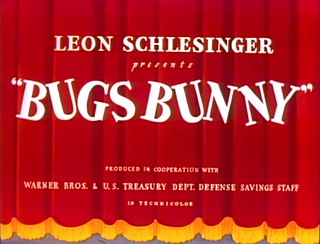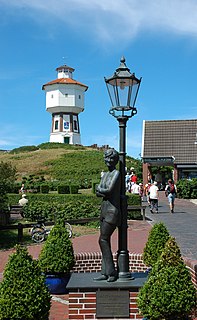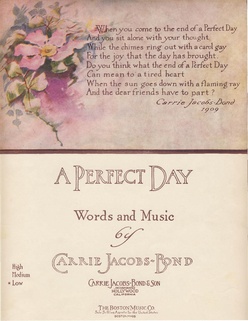 W
W"American Patrol" is a popular march written by Frank White (F.W.) Meacham in 1885. It incorporates both original musical themes by Meacham and melodies from American patriotic songs of the era such as "Columbia, the Gem of the Ocean," "Dixie," and "Yankee Doodle." Composed for piano, it was then arranged for wind band and published by Carl Fischer in 1891. Copyright was assigned to Meacham's widow, Cora, in 1912 and renewed in 1919. The 1885 and 1914 printings for piano do not include "Dixie."
 W
W"Any Bonds Today?" is a song written by Irving Berlin, featured in a 1942 animated propaganda film starring Bugs Bunny. Both were used to sell war bonds during World War II.
 W
W"Beat Me Daddy, Eight to the Bar" is a song written in 1940 by Don Raye, Hughie Prince, and Ray McKinley. It follows the American boogie-woogie tradition of syncopated piano music.
 W
W"Beer Barrel Polka", also known as "The Barrel Polka" and "Roll Out the Barrel", is a song which became popular worldwide during World War II. The music was composed by the Czech musician Jaromír Vejvoda in 1927. Eduard Ingriš wrote the first arrangement of the piece, after Vejvoda came upon the melody and sought Ingriš's help in refining it. At that time, it was played without lyrics as "Modřanská polka". Its first text was written later by Václav Zeman – with the title "Škoda lásky".
 W
W"Boogie Woogie Bugle Boy" is a World War II jump blues song written by Don Raye and Hughie Prince which was introduced by The Andrews Sisters in the Abbott and Costello comedy film Buck Privates (1941). The Andrews Sisters' Decca recording reached number six on the U.S. pop singles chart in the spring of 1941 when the film was in release. The song is ranked No. 6 on Songs of the Century. Bette Midler's 1972 recording of the song also reached the top ten on the U.S. Billboard Hot 100.
 W
W"Comin' in on a Wing and a Prayer" is a World War II song with lyrics by Harold Adamson and music by Jimmy McHugh, published in 1943 by Robbins Music Corp.
 W
WThe Connecticut March is a song originally from 1911, which was written by William Nassann. It was republished in 1913 and published again by Paull-Pioneer Music in 1938.
 W
W"Don't Sit Under the Apple Tree " is a popular song that was made famous by Glenn Miller and by the Andrews Sisters during World War II. Its lyrics are the words of two young lovers who pledge their fidelity while one of them is away serving in the war.
 W
W"Farewell of Slavianka" is a Russian patriotic march, written by the composer Vasily Agapkin in honour of Slavic women accompanying their husbands in the First Balkan War. The march was written and premiered in Tambov in the end of 1912. In summer of 1915 it was released as a gramophone single in Kiev. Slavjanka means "Slavic woman".
 W
WDer Fuehrer's Face is a 1943 American animated anti-Nazi propaganda short film produced by Walt Disney Productions, created in 1942 and released on January 1, 1943 by RKO Radio Pictures. The cartoon, which features Donald Duck in a nightmare setting working at a factory in Nazi Germany, was made in an effort to sell war bonds and is an example of American propaganda during World War II. The film was directed by Jack Kinney and written by Joe Grant and Dick Huemer. Spike Jones released a version of Oliver Wallace's theme for the short before the film was released.
 W
W"(There'll Be a) Hot Time in the Town of Berlin " is a 1943 song with music and lyrics by Joe Bushkin and John DeVries, published by Barton Music Corp.
 W
W"I'll Be Home for Christmas" is a Christmas song written by the lyricist Kim Gannon and composer Walter Kent and recorded in 1943 by Bing Crosby, who scored a top ten hit with the song. Originally written to honor soldiers overseas who longed to be home at Christmas time, "I'll Be Home for Christmas" has since gone on to become a Christmas standard.
 W
W"J'attends un navire", also known as "I Am Waiting for a Ship", is a song written in 1934 by Kurt Weill with lyrics by Jacques Deval. The song was written for the musical Marie Galante but later became an unofficial anthem of the French Resistance.
 W
W"Katyusha", also transliterated as "Katûša", "Katusha", "Katjuscha", "Katiusha" or "Katjusha", is a Soviet folk-based song and military march. It was composed by Matvey Blanter in 1938. The author of the lyrics to the song "Katyusha" was the Soviet poet Mikhail Isakovsky. This song gained fame during World War II as a patriotic song, inspiring the population to serve and defend their land in the war effort. In Russia, the song was still popular as of 1995. The song is the source of the nickname of the BM-8, BM-13, and BM-31 "Katyusha" rocket launchers that were used by the Red Army in World War II.
 W
W"Lili Marleen" is a German love song which became popular during World War II throughout Europe and the Mediterranean among both Axis and Allied troops. Written in 1915 as a poem, the song was published in 1937 and was first recorded by Lale Andersen in 1939 as "Das Mädchen unter der Laterne".
 W
W"Lily of Laguna" is a British coon song written in eye dialect. It was written in 1898 by English composer Leslie Stuart. It was a music hall favourite, performed notably by blackface performers such as Eugene Stratton and G. H. Elliott. In the early 1940s Ted Fio Rito wrote the tune of a new verse and Paul Francis Webster wrote fresh lyrics and it was stripped of its overtly racist lyrics to become a pure love song which continued to be popular into the 1950s.
 W
WMel and George "Do" World War II is a 1990 live album by the American jazz singer Mel Tormé and the British jazz pianist George Shearing.
 W
W"A Perfect Day" is a parlor song written by Carrie Jacobs-Bond (1862–1946) in 1909 at the Mission Inn, Riverside, California. Jacobs-Bond wrote the lyrics after watching the sun set over Mount Rubidoux from her 4th-floor room. She came up with the tune three months later while touring the Mojave Desert. For many years the Mission Inn played "A Perfect Day" on its carillon at the end of each day.
 W
WCzerwone maki na Monte Cassino is one of the best-known Polish military songs of World War II. It was composed in May 1944 in Italy, during the Battle of Monte Cassino, on the eve of the Polish Army's capture of the German stronghold.
 W
W"Stalin Wasn't Stallin' " was a song written in 1943 by Willie Johnson and originally recorded by the a cappella gospel group the Golden Gate Jubilee Quartet in 1943. Robert Wyatt recorded a cover of the song in 1980.
 W
W"There'll Always Be an England" is an English patriotic song, written and distributed in the summer of 1939, which became highly popular following the outbreak of the Second World War. It was composed and written by Ross Parker and Hughie Charles. A popular version was sung by Vera Lynn.
 W
WWe'll Gather Lilacs, also called We'll Gather Lilacs In The Spring, is a song by Welsh composer Ivor Novello which he wrote for the hit musical romance Perchance to Dream. The stage musical opened at the Hippodrome Theatre in London's West End in 1945 and ran until 1948. The song, sung in the show by Olive Gilbert, was the most popular and enduring to emerge from the production. It was originally recorded by Muriel Barron & Olive Gilbert (1945) and by Geraldo and his Orchestra, who reached the UK charts with it in 1946. A recording by Tommy Dorsey and His Orchestra was a minor hit in the US in 1946. It has since been performed by many artists, including notably Anne Ziegler and Webster Booth, Richard Tauber, Bing Crosby, Frank Sinatra (for his album Sinatra Sings Great Songs from Great Britain, Marion Grimaldi and Julie Andrews.
 W
W"We'll Meet Again" is a 1939 British song made famous by singer Vera Lynn with music and lyrics composed and written by English songwriters Ross Parker and Hughie Charles. The song was published by Michael Ross Limited, whose directors included Louis Carris, Ross Parker and Norman Keen. Keen, an English pianist also collaborated with Parker and Hughie Charles on "We'll Meet Again" and many other songs published by the company, including "There'll Always Be an England" and "I'm In Love For The Last Time". The song is one of the most famous of the Second World War era, and resonated with soldiers going off to fight as well as their families and sweethearts.
 W
W"White Christmas" is an Irving Berlin song reminiscing about an old-fashioned Christmas setting. The song was written by Berlin for the musical film Holiday Inn, released in 1942. The composition won the Academy Award for Best Original Song at the 15th Academy Awards.
 W
W"Zog nit keyn mol" sometimes "Zog nit keynmol" or "Partizaner lid" [Partisan Song]) is a Yiddish song considered one of the chief anthems of Holocaust survivors and is sung in memorial services around the world.